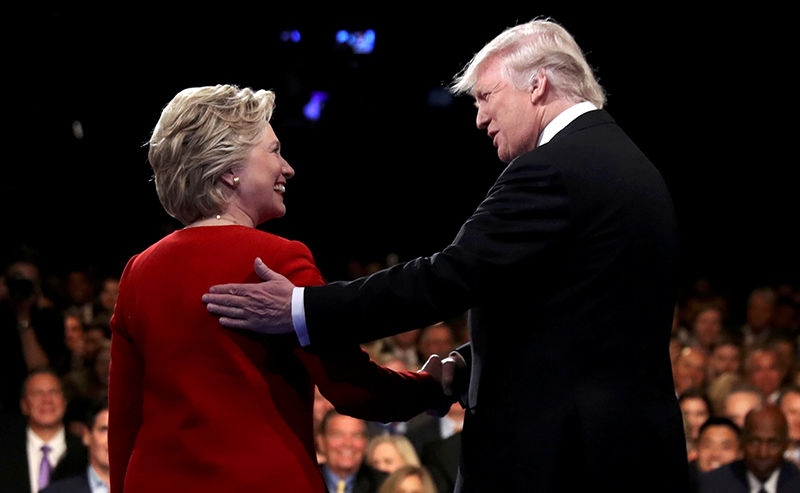Our next season must be one of reconciliation. What’s been ripped apart must now be put back together.
Whoever is elected president on Nov. 8, it’s frightening to think about what comes next and imagine what our country will look like going forward.
Rarely has an election left behind such gaping wounds and such deep division. Hard feelings are the order of the day, and everyone thinks of themselves as victims.
In its final days, the race for the White House became a race to the bottom.
Two intensely unlikable candidates gave up any attempt to make themselves appear more likable, and instead took up the strategy of trying to make the other even more dislikable. It turned out that, in both cases, this wasn’t so hard to do.
The media couldn’t make up its mind whether it wanted to be a fly on the wall, or a player on the field. It wanted the credit for bringing down a candidate it found unsuited to be president — until it remembered that wasn’t its job.
Even more disappointing is how ordinary Americans behaved in the final weeks. They hunkered down in their respective bunkers, tuning out opposing points of view and making excuses for the shortcomings of their candidates.
There was no excuse for some of what was said in the Clinton campaign emails released by Wikileaks.
In one series, Communications Director Jennifer Palmieri engaged, in April 2011, in an amateur theological discussion with John Halpin of the Center for American Progress.
Halpin mocked media mogul Rupert Murdoch for raising his children as Catholics and insisted that the most “powerful elements” in the conservative movement are all Catholic.
“It’s an amazing bastardization of the faith,” Halpin wrote. “They must be attracted to the systematic thought and severely backwards gender relations and must be totally unaware of Christian democracy.”
Palmieri responded: “I imagine they think it is the most socially acceptable politically conservative religion. Their rich friends wouldn’t understand if they become evangelicals.”
“Excellent point,” Halpin wrote back. “They can throw around ‘Thomistic’ thought and ‘subsidiarity’ and sound sophisticated because no one knows what the hell they’re talking about.”
What are these people talking about? Maybe they should just stop talking. Snobbery and ignorance is not an attractive combination.
So here we are, an angry, bitter and divided country where the new president will begin a four-year term with more than 40 percent of the country opposed to their policies and skeptical of his or her integrity. Whole swaths of Congress won’t work with either him or her and impeachment doesn’t seem like such a far-fetched possibility — especially if there is, in the first year, any abuse of power or moral ineptitude. Or maybe the president-elect will be haunted by past scandals. It’ll be impossible to get any bill passed or serious issue addressed.
And through it all, the question you’ll hear most often is this: “Is the United States completely ungovernable?”
As bad as our situation is, I don’t believe all is lost. To be sure, those who attempt to lead us are going to have to possess some awfully impressive qualities: courage, empathy, fair-mindedness, compassion, a willingness to listen to and learn from criticism and opposing points of views.
Our new president, and his or her administration, also has to take on as its primary goal the theme of reconciliation.
Before putting together a new budget, or tackling health care reform, or devising a plan to improve public education, or picking a new Supreme Court justice to fill the vacancy, or any other policy priority you could name, the first item of business is charting a course to convince those Americans who feel wronged, cheated, conned, or otherwise deprived of their choice for president that they matter just as much as anyone else.
The concept of reconciliation is as old as the Scriptures. In 2 Corinthians 5:18-19, “All this is from God, who reconciled us to himself through Christ and gave us the ministry of reconciliation: that God was reconciling the world to himself in Christ, not counting people’s sins against them. And he has committed to us the message of reconciliation.”
The old saying goes: “To the victor goes the spoils.” But this time, after this wacky and wild election is over with, the victor will also get something much more profound: The responsibility to unite what has been divided and mend what is broken.
Ruben Navarrette is a syndicated columnist with The Washington Post Writers Group, a member of the USA Today Board of Contributors, a columnist for the Daily Beast, author of “A Darker Shade of Crimson: Odyssey of a Harvard Chicano” (Bantam), and the editor of MOSH OPINIONS — the opinion page of the multi-platform digital media company MOSH.US.
rn

